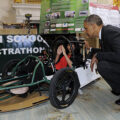black politics on the web
With black unemployment reaching historic levels, banks laying off tens of thousands and law school graduates waiting tables, why aren’t more African-Americans looking toward science, technology, engineering and math — the still-hiring careers known as STEM?
The answer turns out to be a complex equation of self-doubt, stereotypes, discouragement and economics — and sometimes just wrong perceptions of what math and science are all about.
The percentage of African-Americans earning STEM degrees has fallen during the last decade. It may seem far-fetched for an undereducated black population to aspire to become chemists or computer scientists, but the door is wide open, colleges say, and the shortfall has created opportunities for those who choose this path.
STEM barriers are not unique to black people. The United States does not produce as high a proportion of white engineers, scientists and mathematicians as it used to. Women and Latinos also lag behind white men.
Yet the situation is most acute for African-Americans.
Black people are 12 percent of the U.S. population and 11 percent of all students beyond high school. In 2009, they received just 7 percent of all STEM bachelor’s degrees, 4 percent of master’s degrees, and 2 percent of PhDs, according to the National Center for Education Statistics.
From community college through PhD level, the percentage of STEM degrees received by blacks in 2009 was 7.5 percent, down from 8.1 percent in 2001.
The numbers are striking in certain fields. In 2009, African-Americans received 1 percent of degrees in science technologies, and 4 percent of degrees in math and statistics. Out of 5,048 PhDs awarded in the physical sciences, such as chemistry and physics, 89 went to African-Americans — less than 2 percent.
Several factors are cited by scientists, educators and students. One is a self-defeating perception that STEM is too hard. Also mentioned are a lack of role models and mentors, pressure to earn money quickly, and discouraging academic environments.
The impact reaches beyond the black community as America struggles to produce enough scientists to prosper in a world ruled by technology.
“White men make up less than 50 percent of the U.S. population. We’re drawing (future scientists) from less than 50 percent of the talent we have available,” says Mae Jemison, the first black woman astronaut, who has a medical degree and a bachelor’s in chemical engineering.
“The more people you have in STEM,” she says, “the more innovations you’ll get.”
___
Jemison says the problem begins for children of all backgrounds in grade school, where they are usually asked to memorize facts out of a book instead of satisfying their natural curiosity through experiments and exploring. She also says many primary school science teachers took little science in college.
Allen Gordon has been teaching math in Oakland, Calif., for seven years. He always tries to apply real-word situations to his lessons — coupons, compound interest on bank accounts, album sales.
“If math and science seem boring and of no use on a primary education level, who would want to pursue it while in college?” he says. “Especially when you don’t see many, if any, black men or women teaching.”
“Math and science are not something that black men and women sit around and pontificate about at home, dinner parties, the sports bar, hair salon, et cetera,” he says. “It doesn’t fit into their social idea of status.
“Let’s face it, there is no glory in saying, ‘I teach math or science.’ Career school teachers still seem to be very proletarian.”
Even some of Gordon’s fellow teachers ask how he can teach math, saying, “Funny, you don’t look like the nerd type.”
That’s a stereotype Jemison knows well.
[Part two of this article in next week’s SUN]

















Leave a Comment